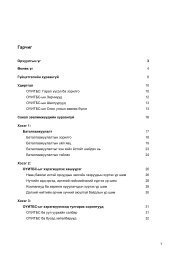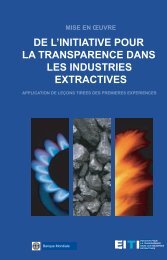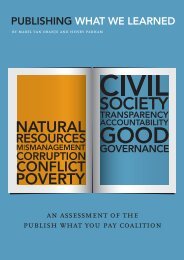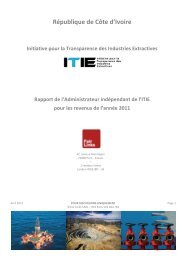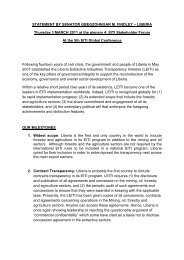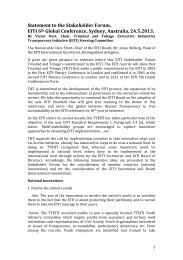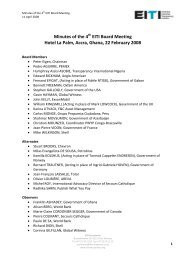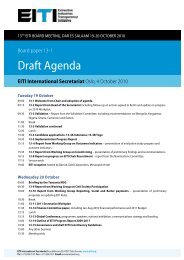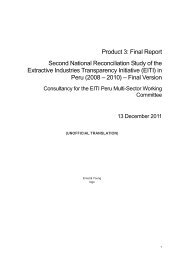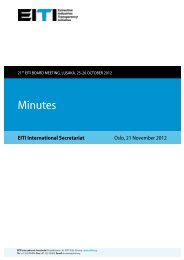Vietnam feasibility study - EITI
Vietnam feasibility study - EITI
Vietnam feasibility study - EITI
You also want an ePaper? Increase the reach of your titles
YUMPU automatically turns print PDFs into web optimized ePapers that Google loves.
42<br />
activities. The support to fishers is only a voluntary act of the company.<br />
Revenue allocation<br />
As petroleum is a typical industry, almost all taxes,<br />
fees, and charges are paid to the central budget<br />
and PVN Group, including the environmental<br />
protection fee and natural resources tax.<br />
Petroleum exploiting entities are required to<br />
pay directly taxes as VAT, personal income tax,<br />
export-import tax, corporate income tax and<br />
natural resources tax to the central budget,<br />
which is allocated in accordance with provisions<br />
on the allocation of state budget.<br />
Some revenues such as petroleum interest are<br />
fee for the use of data are distributed under the<br />
mechanism that a part of which will be handed<br />
over to PVN for management. The remaining<br />
amount will be paid to the state budget.<br />
The flow of cash distribution in petroleum<br />
exploitation is illustrated in Figure 2 above.<br />
In regard to the distribution of profits of PVN, after having excluded retained amounts, invested to the<br />
limited liability company with one member (if any) of which, the Holding company is the owner, after<br />
tax profit is distributed as follows:<br />
• Deducting 10% to the financial reserve fund, where the balance of the fund is 25% of the charter<br />
capital and the deduction will be terminated;<br />
• Deducting 10% for setting up the Fund for petroleum seeking and exploration, where the balance<br />
of the fund is at 10% of the charter capital and the deduction will be terminated;<br />
• Deducting at least 35% to the development investment fund; and<br />
• Deducting to the Fund for reward to the Holding Company’s Executive Committee and the<br />
deducted level shall not exceed VND 1,000 million a year.<br />
The remaining profit shall be allocated to the fund for reward and welfare under the current financial<br />
regime. The balance, if any, shall be paid to the development investment fund.<br />
III.2.3 auditing and promulgation of information<br />
Auditing<br />
Currently, in accordance with provisions of laws of <strong>Vietnam</strong>, the auditing mechanism consists of three forms:<br />
• State audit: applicable to enterprises of which more than 51% of the owner’s capital is subject<br />
to the Law on State Audit No. 37/2005. However, some enterprises of which less than 51% of<br />
the capital is owned by the state may be audited by the state upon request of the Government<br />
Inspectorate or decision of the Prime Minster.<br />
• Independent audit: applicable to companies of which less than 51% of the capital is owned by the<br />
state, foreign invested companies and private companies in line with the Decree No.105/2004/<br />
ND-CP. Recently, the Law on Independent Audit is in the preparation and as planned, this Law<br />
shall obtain the opinion of the National Assembly in 2011.<br />
• Internal audit: applicable to state-owned enterprises in accordance with Decision No. 832/TC-<br />
QD-CDKT dated 28/10/1997 of the Ministry of Finance.<br />
The Extractive Industries Transparency Initiative and the Implementation Perspective of <strong>Vietnam</strong><br />
Holding companies, exploiting entities or <strong>Vietnam</strong>ese<br />
contractors shall be authorized to perform the<br />
declaration, direct payment to the state budget upon<br />
really arising following items:<br />
a) 50% of the petroleum interest of the host country is<br />
distributed from Vietsopetro Joint stock company;<br />
b) 50% of the oil and gas interest of the host country<br />
is distributed from Product distribution contracts<br />
after having deducted 1.5% of which for the Holding<br />
company to cover expenses of management,<br />
supervision over petroleum contracts;<br />
c) Entire receipts from petroleum commissions of all<br />
types (signature commission, finding commission,<br />
production commission);<br />
d) 30% of the receipts from the fee for the reading<br />
and use of petroleum materials<br />
(Decree No. 142/2007/ND-CP)



